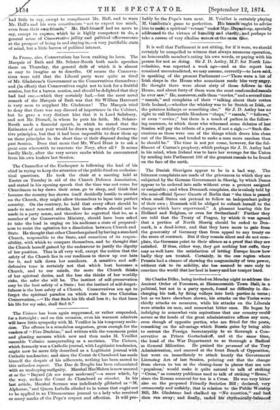The Chancellor of the Exchequer is following the lead of
his chief in trying to keep the attention of the public fixed on ecclesias- tical questions. He took the chair at a meeting held at Exeter on Tuesday in aid of the Church Defence Association, and stated in his opening speech that the time was not come for Churchmen to lay down their arms, go to sleep, and think that because the country has shown itself decidedly hostile to attacks on the Church, they might allow themselves to lapse into perfect security. On the contrary, he held that every effort should be made to meet renewed attacks, but these efforts should not be made in a party sense, and therefore he regretted that he, as a member of the Conservative Ministry, should have been asked -to take the lead in urging on his audience a state of prepared- ness tO resist the agitation for a dissolution between Church and State. He thought that other Churches gainedbyhaving a standard Church, responsible to the State, and- conscious of its respon- sibility, with which to compare themselves, and he thought-that the Church herself gained by the endeavour to justify the dignity of her position. That is all very well, except the notion that the safety of the Church lies in our readiness to throw up our hats for it, and talk down her assailants. A sensitive and self- defensive tone is certainly not that which best becomes a Church, and to our minds, the more the Church thinks. of her spiritual duties, and the less she thinks of her worldly. risks, the safer she will be. The instinct of self-preservation may be the best safety of a State ; but the instinct of self-forget- fulness is the best safety of a Church. Conservatives are apt to forget the spiritual paradox on which rests the true Christian Conservatiem,—" He that finds his life shall lose it ; he that loses his life for my sake, shall find it."






























 Previous page
Previous page